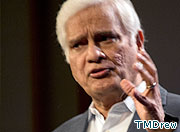A Christian evangelist and author has called for Christians to bridge the gap between the church and modern secular culture regarding same-sex marriage, without compromising on the truth.
Writing in the aftermath of the US Supreme Court’s gay marriage ruling, Ravi Zacharias outlined why the Christian world-view is so distinct from those who support same-sex marriage.
He urged supporters of traditional marriage to reach out to those who disagree with them with the truth of the gospel.
Humanity
In a blog titled ‘How Wide the Divide: Sexuality at the Forefront, Culture at the Crossroads’, Zacharias begins by recognising the part the church has had to play in creating the divide because it has failed to stand up for the truth as culture “moved unabashedly towards the mockery of the Christian worldview”.
But he points out that the gulf between Christianity and secular society is to be expected as the mindsets are so opposed in their understanding of “what it means to be human”.
For the Christian, “life is in the soul. The body is the temporal home”. Whereas: “For the one living with a secular worldview there is no such thing as the soul.”
For the secularist then: “A soul-less existence makes the body the sole means of fulfillment.” Therefore, “pleasure sets the rules”.
Relativism
Zacharias, the director of Ravi Zacharias International Ministries (RZIM) which, together with Wycliffe Hall, creates the partnership known as the Oxford Centre for Christian Apologetics, also stresses that Christians believe in absolutes, whereas: “For the secular person, moral relativism is the only absolute”. Meaning, “there is no boundary for behaviour”.
According to Zacharias, the pervading assumption in modern culture is that: “Relativism is the open door to fun, absolutes the closed door that destroys fun.”
“Relativist convictions are supposedly prejudice-free, while absolute convictions are branded as phobias.”
This has meant that “all questioning of sexual freedom is castigated as a phobia”.
Absolutes
However, the author insists that there are absolutes.
“The biblical description of marriage”, Zacharias continues, “is for one man and one woman in sacred commitment. So profound is this union that the relationship of God to the Church bears that comparison. He is the bridegroom; the Church is the bride”.
He states, “it is vacuous to say that if two people love each other they may express it in any way they choose. Love is not defined in a way that is self-referencing. It ultimately hangs on the peg of God’s love and how He defines love.”
Bridge
“This is where the gospel enters as the only way to bring us together”, he adds, as “the only bridge I know of that can change the human heart”.
Christians, he says, “need to awaken to the unpleasant reality that we have not taught and proclaimed God’s Word faithfully and demonstrated true holiness”.
In addressing the gulf between Biblical teaching and secular values, Zacharias concludes that “our message to the world must be clear”.
Transformation
“God transforms the heart and mind and we become his children and his ambassadors. Let us so live that we will never be accused of hate or indifference.
“But let us also know that compromising the truth is a serious blunder and ends up celebrating that which is not in the will of our Father.
“This is a painful tension for a believer. To be seen as rejecting a belief or a behaviour is not the same as rejecting the person. But God helps us to carry that burden.”

